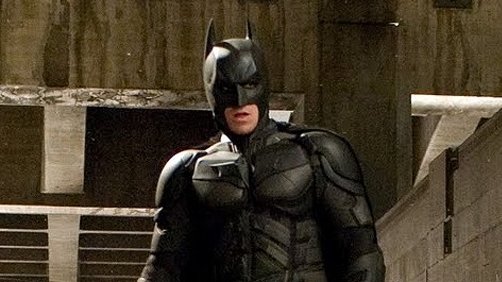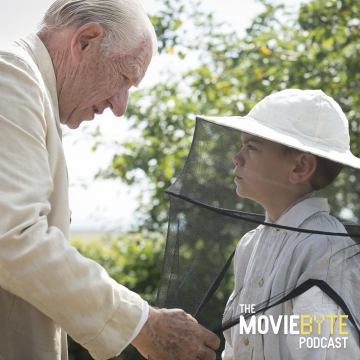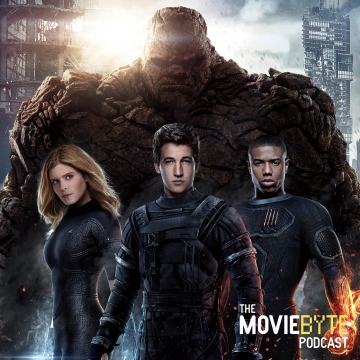In the spirit of encouraging enthusiastic discussion we like to share others opinions of movies on our site on occasion. This is a guest post by my brother, Nathaniel Darnell. Nathaniel holds his juris doctorate from Oak Brook College of Law and serves as the Director of Ministry Advancement at American Vision. He is the author of the novel Glory, Duty, & Gold Dome, and the producer of over 100 commercial videos. Before working as the Director of the Video Department at Vision Forum Ministries for five years, he served for eight years as a legislative aide at the Georgia State Capitol. In 2011 he wrote, directed, and co-produced a Christian action-thriller concept pilot entitled Jimmy Valiant: Scions of Danger. You can connect with Nathaniel on Facebook.
— Joe

Christopher Nolan’s final chapter in the Batman series continues to stress the moral messages about man’s self-determination in the compelling, although ultimately hollow, way that Nolan has become famous for over the last decade.
First off, I have to say that even when Christopher Nolan is showing signs of storyteller exhaustion, as he does in The Dark Knight Rises, he still stands out way above the pack. Let’s highlight just a few strong points. Number one, he’s a master of suspense. I’m pretty good at predicting plot-twists in movies, but Nolan is the best by far for throwing me for a loop. His mastery at creating suspense is seen in how he sets up not only false resolutions but also false dangers.
For example, in the recent movie we find Batman caught by police in the middle of Gotham holding a computer that says somebody’s money just got sucked away. Nolan sets up the scene so that the viewer thinks the danger is that Batman’s going to be blamed for the criminals’ theft. But we already saw that before in the last movie, so Nolan surprises us by making the stolen money belong to Bruce Wayne, Batman’s alter ego. Never seen that in a Batman film before. It was one of several brilliant tensions for Nolan to explore because it had not been done before and few would see it coming.
Likewise, at the climax of the film, [Big Spoiler Alert here!] as Batman finally seems to be getting the upper hand of Bane, a dagger comes from the character the audience would least suspect, and we discover that Bane was never the real arch-rival of this film at all. It’s another great example of false danger.
Do some of Nolan’s plot twists seem contrived and hard to believe? Yes, at least a handful of times, but given the huge number of plot twists in the movie (some subtle, some very pronounced) his batting average is pretty good. The brilliance of the good twists almost makes the bad ones forgiveable.
Number two, Nolan does a good job of making all the characters seem fully-orbed and personal. No one comes across as flat. There’s a lot of heart behind each face. Nolan also goes the extra-mile of making each of Batman’s villains in the series metaphorical to internal struggles that Bruce Wayne must overcome in the story as he develops as a character. For example, Bruce struggles with fear in the first movie, and the Scarecrow represents that fear.
Although overall The Dark Knight Rises may not be as fun a film as The Avengers, it has something The Avengers didn’t: grit. Ironically this summer, Marvel’s turned out to be more shine and sparkle while D.C. presents the strongest underdog hero. That’s quite a flip considering the two comic companies’ life-long reputations. Despite all of the exertion of the super-powered heroes in The Avengers, none of them make my muscles ache like they do when I watch Batman get up again after he’s been knocked down a dozen times in this movie.
However, from a story-telling standpoint, the single most frustrating moment in the film — I have to say — appears when one of the antagonists is saying last words before dying. Batman and a handful of other hero characters stand around quietly and earnestly listening while the timer for a massive nuclear bomb is ticking away. Despite the urgency before and after that moment in the story, Batman acts as if he has plenty of time to pause and listen. What was Nolan thinking? This is why I say Nolan shows some signs of storyteller’s exhaustion. The corner-cutting and brain-lapse story points at times hint at a writer and director who’s already poured himself out, twice, for a franchise and is ready to move on. The lack of superb attention to detail we’ve come to expect in a Nolan film just isn’t quite there.
Is there a connection between the moral messages of
Nolan’s Batman series and the shootings in Aurora, CO?
My biggest concern with The Dark Knight Rises, however, isn’t the signs of storyteller’s exhaustion. My biggest concern is the moral exhaustion a culture inevitably faces as it conforms to its own theological and philosophical assumptions—the kind of philosophical assumptions Nolan addresses so powerfully in his movies. I’m concerned about boys in Aurora, Colorado who grow up in a government school system that teaches them there is no God, the Bible is a myth, and that we’re all just the products of random chance by evolution, a mere complex combination of chemicals. I’m concerned about such boys in Aurora, Colorado who eventually begin to connect the dots, see the logical implications of these assumptions about God and reality to their purpose and moral basis in life. They begin to realize that if the God of the Bible doesn’t exist, then man cannot be responsible for his actions since they are merely the product of biochemical stimuli. I’m concerned that the logic of those implications leads them to identify more with villains in Nolan’s series like the Joker and Bane than they do with Batman.
“Some men can’t be bought, bullied, reasoned, or negotiated with. Some men just want to see the world burn,” says Alfred about the Joker in Nolan’s The Dark Knight (2008). Afred explains that some villains don’t want money or power, they just want to show to the world that the world is meaningless, that life is meaningless, that morals are meaningless.
This is the kind of frame of mind that leads a boy to walk into a movie theater in Aurora, Colorado and for no apparent purpose other than to demonstrate the meaninglessness of life, open fire on a group of people watching The Dark Knight Rises.
This kind of thing has happened before, so it shouldn’t surprise us. Remember the shooters at Columbine? Why did they kill all those students? Well, they were big fans and readers of the existentialist Fredrich Nietzsche, who during his lifetime articulated a philosophy pushing toward nihilism. Nietzsche pointed out that without God, much of life loses its prior restraint. Without God to give life meaning, man has no ultimately compelling reason to not destroy his fellow-man. Nietzche also highly influenced Adolf Hitler, one the biggest mass-murderers of the previous century. The boys in the Leopold and Loeb case who notoriously escaped the death penalty for killing a fat boy in their town “just for the fun of it” had been reading Nietzsche just before their murder.
Nietzche connected the dots between existentialism and nihilism in his writings. He was a philosopher ahead of his time in that he foresaw that for humanist man to be consistent with his rejection of God, he would inevitably take the road to nihilism, the rejection of all meaning, and live not so very unlike the Joker in Nolan’s film.
Nolan has been very self-conscious of the West’s slide toward existentialism and nihilism. All of his movies address these philosophies heavily, and it’s apparent that Nolan is himself something of an existentialist. Many assume existentialists are simply people who like passion, or people who feel passionately. It is true that many existentialist philosophers were passionate and thought that people should be more passionate about their personal beliefs, but the essence of existentialism is not passion.
For virtually all existential philosophers, devotion is the test of virtue. On this test Kierkegaard, Nietzsche, and Satre were all in complete agreement.
Existentialism makes the individual the sole arbiter of his reality. What he chooses to believe is real for him. He can choose to believe or not believe in God, but God cannot objectively exist. Because of this, there is no transcendent basis for justice or injustice. Morality is completely subjective. To the existentialist, the great power in the universe is man’s free will, and by exercising great determination in his free will, man proves that he is his own master (effectively, his own god).
Nolan’s existentialism comes out most clearly in his early film Memento (2000). In Memento the main character with his short-term memory loss first believes he is searching for the villain of the story. [Another major spoiler alert] When he discovers that he is the villain, he refuses to accept this reality. Exerting his own determined free will, he chooses to “control his reality” by choosing to make another man the villain in his own mind and insisting on believing he himself is the hero. He acts based upon this choice and no one in the movie is able to stop him from conforming “reality” to what he has chosen to believe.
So we see in many of Christopher Nolan’s films how he likes to pit men of very strong conviction against one-another. In Batman Begins (2005), Bruce Wayne develops strong convictions for procedural justice and against killing and is forced to go toe-to-toe with his mentor Ra’s al Ghul who has the strong conviction that justice demands Gotham be destroyed by those who will take justice into their own hands. They both have a strong moral belief and rather than spending much time debating the merits of their different beliefs, they simply act with great determination to implement them.
“Why do we fall? So we can pick ourselves up again,” Bruce remembers his father saying. It doesn’t matter what your objective is in picking yourself up again, just as long as you do. So why shouldn’t Ras al Ghul pick himself up again and continue promoting his will? Why should Bane not pick himself up and continue promoting his will?
In The Dark Knight, Christopher Nolan presents us with the Joker, who is perhaps the most intellectually consistent humanist existentialist ever seen in film. Nolan presents an incredibly accurate depiction of the depravity of man in the Joker’s character. Man, without a transcendent God, has no reason whatsoever to be moral or to believe in any kind of justice, fairness, order, or value of any kind, reasons the Joker in the movie. The Joker’s determination to live out his convictions go against Batman’s convictions that justice is a thing that should be upheld even if there is no compelling reason to believe in it. Batman takes his determination to promote his concept of justice to such an extent that he will even lie — oppose external reality — about Harvey Dent by taking the blame for Harvey’s wrongs, just so others will have the subjective (baseless) but internal conviction that Batman’s justice exists.
The Dark Knight up to Act III presents a remarkably brilliant case for why humanism is self-destructive because if taken to its logical conclusions, we should all live like the Joker. Nolan inserts his objection in Act III, however, communicating through Batman and Commissioner Gordan, “No, no. Wait a minute. You can still believe in modern notions of justice and be a humanist. See?” Whether justice is rooted in a transcendent moral standard is beside the point, implies Nolan, as long as you believe in justice with such strong conviction that you will sacrifice anything to promote it.
Because the greatest force in the existentialist worldview is man’s determination to pursue his own free will choices. What Nietzsche called “the will to power.”
What’s really being pushed in the Batman movies is not Batman’s morality but rather his conviction of will. He has no compelling reason in the series to fight for his notion of justice with the level of determination and discipline that he does, especially in The Dark Knight Rises, but just the fact that he still fights on against all opposing forces — against even the truth itself — is why Nolan implies he is the hero. Nolan has proven himself very adept at drawing his audience in and evangelizing/discipling them with his existentialist worldview in an entertaining story. In The Dark Knight Rises we see the greatest test of Batman’s determination of will as he has to push himself up after facing the blow of his girlfriend’s death, the loss of his fortune, the loss of his dearest confidant Alfred, the loss of his gadgets, the debilitation of being brutally, physically broken at the hands of Bane, the imprisonment in a deep pit in a foreign, faraway land, and the loss of his city Gotham to criminals run-amok. The fact that Batman surmounts these obstacles in the story seems encouraging, but what if someone less noble possessed the same level of determination Batman exudes?
In an existentialist worldview, a Muslim terrorist suicide bomber may be one of the most virtuous people in the world because of his conviction of will. A Shinto kamikaze pilot may be virtuous because of his determination despite the lives he destroys. This redefining of virtue is not at all what the Bible teaches.
Conclusion
In Nolan’s series, Batman’s answer to the Joker and Bane’s worldview assertions are totally inadequate because they do not appeal to the transcendent moral standard of God — a standard that exists apart from an individual’s conviction or lack of conviction. It’s no wonder boys who are fans of the series would see the stronger internal-consistency of the Joker’s philosophy and imitate it in real life.
In Christianity there is an internal or personal element to our relationship with God, but there is also an objective, external, and transcendent aspect to it. He is whether we believe in Him or not. His highest name in the Bible is “I am,” as He revealed to Moses in Exodus 3:14 and reaffirmed in John 18:5–8, emphasizing that He exists apart from anyone else. He just is, and He holds us accountable to His moral Law.
God’s Law exists, first, to convict man of sin by showing him his sinful nature. Second, to provide society with order. Third, to guide people in following God’s will. Only by returning to God and His Word can we find a sure basis of morality, of the hope of forgiveness from our immorality in the sacrificial atonement of Jesus Christ, and of the divine power to obey God’s standard of morality. “For it is God which works in the heart of the redeemed person, “both to will and to do of His good pleasure” (Philippians 2:13).
• This article originally appeared on Examiner.com.


